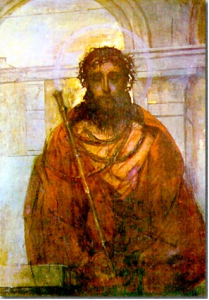In this image of Christ known as “Ecce Homo,” we see him beaten and spat upon, wearing a crown of thorns and a purple cloak, and holding a reed for a scepter. Incapable of understanding Divine Love, the powers of evil have arrayed Christ as a king in mockery. They do not understand that his kingdom is not of this world, for he is not a king like unto the kings and rulers of the world, but rules by making a complete gift of his life.
All of us have come to know Christ as this sort of king–but if we always recognize him this way, do we always acknowledge the Father to be the same kind of king as his Son? Jesus reveals God not only by telling us about him but by being his perfect image. Jesus is “cut out of the same cloth” as God his Father: “God from God, Light from Light, true God from true God.”
“Whoever has seen me has seen the Father.” (Jn 14:9)
I think that reflection on these words of Christ as we gaze upon his face can help us draw closer to the Heavenly Father. When we look at Jesus and think of him, we think of forgiveness and compassionate love. We pray to our Brother and God Jesus Christ with devotion because he has captured our hearts. We know that the face of our Savior reveals the love that not only heals but suffers wounds–a love that not only sets prisoners free but also suffers with us prisoners as a prisoner himself. Do we sufficiently realize that the love of Jesus is the self-same love of God the Father? Do we understand the true implications of the fact that they share the same Holy Spirit?
And further, do we know that in the truest sense it is God the Father who is our ultimate goal? Indeed, Christ came into the world not so that we could follow him to himself, but so that we might follow him to the One he called Abba: calling out his name with trust and love, and indeed loving our Abba with all our hearts, all our minds and all our strength.
“Amen, amen, I say to you, a son cannot do anything on his own, but only what he sees his father doing; for what he does, his son will do also” (Jn 5:19).
There is no justification whatsoever for fearing to approach the Father if we are unafraid to approach the Son. In fact, it was so that his Father might be better known and loved that the Son came. The next time we read or hear the Gospel accounting of Christ’s great words and deeds of compassion, especially those that have always struck us most profoundly, it would be good to think also of the words, “Whoever has seen me has seen the Father,” and “a son cannot do anything on his own, but only what he sees his father doing.” Then perhaps our hearts might be more open with love to the One from whom all, even Christ the Son, have come–the One whom Christ worshiped and was unafraid to call “Abba.”
“As the Father has sent me, even so I send you” (Jn 20:21).
Loving God the Father through Jesus Christ, we are also sent on mission by the Father through Christ. Our first task and calling, loving the Father and Son, leads to our second task and calling, bringing others into the same divine fellowship (See 1 Jn 1:3). Evangelization must be grounded in daily communion with God – in Divine Love – otherwise we are just “a noisy gong or a clanging symbol” (1 Cor 13:1). For how can we truly lead others to their final goal, God the Almighty Father, if we ourselves do not have true communion with him through Christ? Like Christ himself, our whole lives should be directed towards “the Father, from whom every family in heaven and on earth is named” (Eph 3:15).


Very true and God established one Church!!!!!